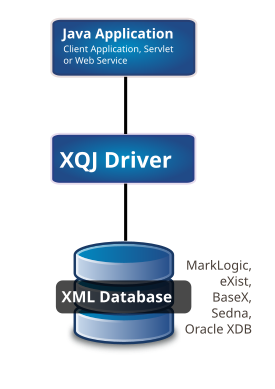
An object database or object-oriented database is a database management system in which information is represented in the form of objects as used in object-oriented programming. Object databases are different from relational databases which are table-oriented. A third type, object–relational databases, is a hybrid of both approaches.
Structured Query Language (SQL) is a domain-specific language used in programming and designed for managing data held in a relational database management system (RDBMS), or for stream processing in a relational data stream management system (RDSMS). It is particularly useful in handling structured data, i.e., data incorporating relations among entities and variables.

Extensible Markup Language (XML) is a markup language and file format for storing, transmitting, and reconstructing arbitrary data. It defines a set of rules for encoding documents in a format that is both human-readable and machine-readable. The World Wide Web Consortium's XML 1.0 Specification of 1998 and several other related specifications—all of them free open standards—define XML.
XSLT is a language originally designed for transforming XML documents into other XML documents, or other formats such as HTML for web pages, plain text or XSL Formatting Objects, which may subsequently be converted to other formats, such as PDF, PostScript and PNG. Support for JSON and plain-text transformation was added in later updates to the XSLT 1.0 specification.
Object–relational mapping in computer science is a programming technique for converting data between a relational database and the heap of an object-oriented programming language. This creates, in effect, a virtual object database that can be used from within the programming language.
eXist-db is an open source software project for NoSQL databases built on XML technology. It is classified as both a NoSQL document-oriented database system and a native XML database. Unlike most relational database management systems (RDBMS) and NoSQL databases, eXist-db provides XQuery and XSLT as its query and application programming languages.
Jakarta PersistenceAPI is a Jakarta EE application programming interface specification that describes the management of relational data in enterprise Java applications.
SQL/XML or XML-Related Specifications is part 14 of the Structured Query Language (SQL) specification. In addition to the traditional predefined SQL data types like NUMERIC, CHAR, TIMESTAMP, ... it introduces the predefined data type XML together with constructors, several routines, functions, and XML-to-SQL data type mappings to support manipulation and storage of XML in a SQL database.
Language Integrated Query is a Microsoft .NET Framework component that adds native data querying capabilities to .NET languages, originally released as a major part of .NET Framework 3.5 in 2007.
XPath is an expression language designed to support the query or transformation of XML documents. It was defined by the World Wide Web Consortium (W3C) in 1999, and can be used to compute values from the content of an XML document. Support for XPath exists in applications that support XML, such as web browsers, and many programming languages.
Apache Empire-db is a Java library that provides a high level object-oriented API for accessing relational database management systems (RDBMS) through JDBC. Apache Empire-db is open source and provided under the Apache License 2.0 from the Apache Software Foundation.
XQuery is a query and functional programming language that queries and transforms collections of structured and unstructured data, usually in the form of XML, text and with vendor-specific extensions for other data formats. The language is developed by the XML Query working group of the W3C. The work is closely coordinated with the development of XSLT by the XSL Working Group; the two groups share responsibility for XPath, which is a subset of XQuery.
Java Database Connectivity (JDBC) is an application programming interface (API) for the Java programming language which defines how a client may access a database. It is a Java-based data access technology used for Java database connectivity. It is part of the Java Standard Edition platform, from Oracle Corporation. It provides methods to query and update data in a database, and is oriented toward relational databases. A JDBC-to-ODBC bridge enables connections to any ODBC-accessible data source in the Java virtual machine (JVM) host environment.
Effi is C++ application development framework.
In database management systems (DBMS), a prepared statement, parameterized statement, or parameterized query is a feature where the database pre-compiles SQL code and stores the results, separating it from data. Benefits of prepared statements are:

An XML transformation language is a programming language designed specifically to transform an input XML document into an output document which satisfies some specific goal.
Zorba is an open source query processor written in C++, implementing
Stylus Studio is an integrated development environment (IDE) for the Extensible Markup Language (XML). It consists of a variety of tools and visual designers to edit and transform XML documents and legacy data such as electronic data interchange (EDI), comma-separated values (CSV) and relational data.
JSONiq is a query and functional programming language that is designed to declaratively query and transform collections of hierarchical and heterogeneous data in format of JSON, XML, as well as unstructured, textual data.
Oracle TopLink is a mapping and persistence framework for Java developers. TopLink is produced by Oracle and is a part of Oracle's OracleAS, WebLogic, and OC4J servers. It is an object-persistence and object-transformation framework. TopLink provides development tools and run-time functionalities that ease the development process and help increase functionality. Persistent object-oriented data is stored in relational databases which helps build high-performance applications. Storing data in either XML or relational databases is made possible by transforming it from object-oriented data.



